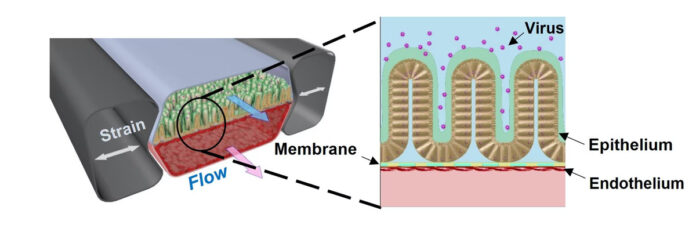Human intestine chip helps researchers investigate COVID’s impact on the intestines and the effects of various potential drugs.
Although the novel coronavirus is famous for causing respiratory symptoms, approximately 60% of people also experience gastrointestinal symptoms. These include vomiting, abdominal pain, and diarrhea. However, the exact mechanism behind the development of such symptoms remains clear. Moreover, animal models provide limited understanding of the interactions between SARS-CoV-2 and the human gut. Therefore, researchers at Harvard’s Wyss Institute have developed a human Intestine Chip for studying coronavirus’s effect on the intestines and identify potential treatments.
The human Intestine Chip consists of two parallel channels: lower one containing blood vessel cells and the upper level containing human intestine lining cells. A permeable membrane separates the two channels, allowing substances to travel from blood to the gut and vice versa. Moreover, the USB-sized device also applies a rhythmic force on the cells to mimic gut peristalsis.
As part of the study, researchers infected the intestine chip with NL63, a coronavirus that causes the common cold, and similar to SARS-CoV-2 uses ACE2 receptor cells for entry into cells. Upon infection, the team noticed a leaky and damaged epithelial layer. Thus, creating a preclinical model for studying coronavirus infection of the human gut.
This study demonstrates that we can explore complex interactions between cells, pathogens, and drugs in the human intestine using our Intestine Chip as a preclinical model.
– Dr. Don Ingber, senior study author
Remdesivir – More Damaging Than Therapeutic
The team further analyzed the intestinal effects of various drugs currently in use against SARS-CoV-2. The team first administered nafamostat, an anti-coagulant drug, to the chip. After 24 hours, researchers noticed a significant reduction in viral levels in the chip. Next, they tried the same experiment using the FDA-approved anti-viral, remdesivir. Surprisingly, the anti-viral had no effect on the infection. Instead, it led to intestinal tissue damage.
We were surprised that remdesivir displayed such clear toxicity to the vascular tissue in the Intestine Chip. GI symptoms have been previously reported in clinical trials of remdesivir, and this model now gives us a window into the underlying causes of those symptoms.
– Dr. Girija Goyal, study author
The team tested various other COVID-19 drugs such as toremifene, nelfinavir, clofazimine, and fenofibrate. Although all had shown anti-viral activity against SARS-CoV-2 in in-vitro studies, only toremifene had a similar efficacy as nafamostat in reducing viral load.
In conclusion, the human Intestine Chip provides a useful preclinical model for testing potential anti-COVID-19 therapeutics and their effect on the gut.
Reference:
Bein, Amir, et al. “Enteric Coronavirus Infection and Treatment Modeled with an Immunocompetent Human Intestine-on-a-Chip.” Frontiers in Pharmacology, vol. 12, 2021, doi:10.3389/fphar.2021.718484.




